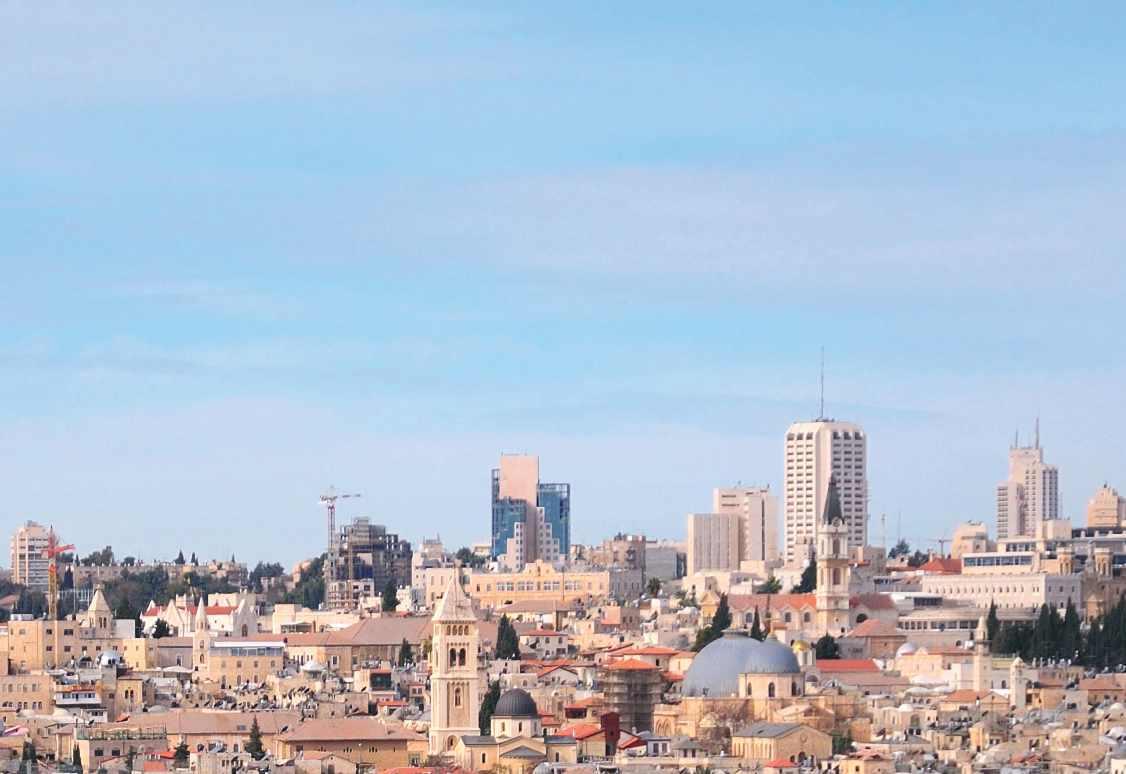Binding faith with reason
Hatred & hypocrisy
Douglas Murray book review p25 Anthony Julius on Abraham P26


Douglas Murray book review p25 Anthony Julius on Abraham P26

by Lee Harpin lee@jewishnews.co.uk
Board of Deputies president Phil Rosenberg has written to all deputies to condemn the abuse emerging in public and private forums during the row over a letter published in the Financial Times criticising Israel over the war in Gaza. In a letter sent as the Board con-
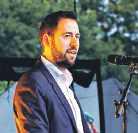
firmed that it was suspending two deputies and launching an investigation into the 36 members who had signed the letter, Rosenberg wrote that “this has been an extraordinarily challenging few days”.
He added: “It’s important none of us lose sight of civility and decency. I’m mindful of abuse that has been thrown around this issue both on social media and
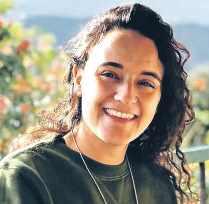
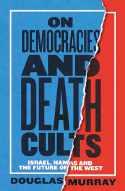

direct communications. I utterly condemn it from whatever source and whatever direction.”
Rosenberg noted the Board has a duty of care to all its sta and deputies and continued: “I would particularly request that deputies are respectful in their own commentary on this matter both publicly and in private – and are respectful and considerate of each other, including those with whom they may have significant di erences of opinion.”
Continued on page 3
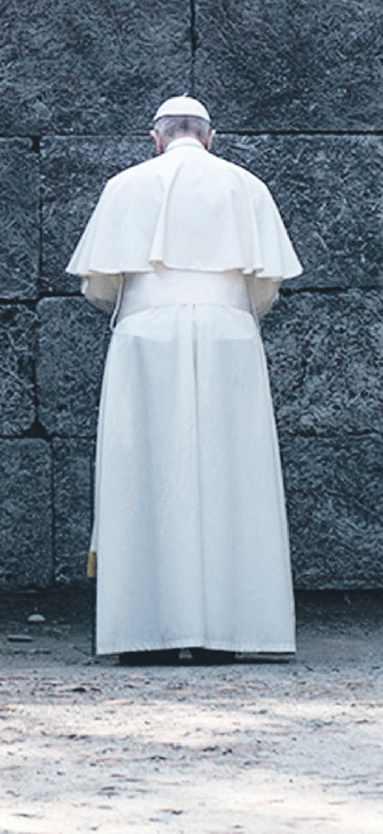
Jewish leaders this week paid tribute to Pope Francis – pictured on a visit to Auschwitz in 2014 – following his death at age 88, honouring his efforts to strengthen Catholic-Jewish relations. Story and analysis, page 4
Emily Damari says words cannot express her excitement at being chosen to light a torch at Israel’s Independence Day ceremony, writes Michelle Rosenberg.
The 28-year-old BritishIsraeli, who was abducted from Kfar Aza on 7 October 2023, was the last British hostage to be freed from
Gaza, after 471 days in captivity. She will join fellow former hostage Eli Sharabi to mark the transition from mourning on Memorial Day (Yom Hazikaron) on 30 April to celebrating on Independence Day (Yom Haatzmaut) on 1 May.
Following the announcement by Israeli transporta-
tion minister Miri Regev, who is in charge of the ceremony, Damari took to Instagram to express her surprise and gratitude.
“Exactly three months ago I emerged, wrapped in this flag behind me, returned from Hamas captivity in Gaza, coming out of darkness into light,” she wrote.
“Today I learned I’m lighting a torch at the Independence Day ceremony. In honour of the hostages, in honour of Gali and Zivi [Berman] and the other additional 57 hostages who are waiting to return home to their families.”
Describing it a “privilege”, Damari added that
“words cannot express how excited I am to do this,” giving thanks for the honour and acknowledging the “security forces and the soldiers of the IDF who risked their lives and are risking their lives so we can raise this flag with pride and light the torch every Independence Day. Am Y’Israel Chai!”
by Lee Harpin lee@jewishnews.co.uk
Jewish members of one of the biggest and more moderate teaching unions have expressed alarm at the appointment of former Fire Brigades Union (FBU) chief Matt Wrack as their new general secretary.
Wrack, who once described the crisis in Labour under Jeremy Corbyn as “the so-called furore about so-called antisemitism”, has been confirmed as general secretary of NASUWT (National Association of Schoolmasters Union of Women Teachers), which has a substantial Jewish membership.
His appointment, as the first leader in its history to have never been a qualified teacher or lecturer means that, alongside the National Education Union (NEU), both teaching unions
are now under far-left leadership.
The hard-left general secretary of the National Education Union has sparked fury in the community with his stance on Israel and Palestine, including a call to globalise the “intifada” in a speech.
Russell Langer, director of communications at the Jewish Leadership Council, told Jewish News: “Jewish teachers who are members of the NASUWT will be rightly concerned by a general secretary who played a leading role in downplaying antisemitism in the Labour Party.
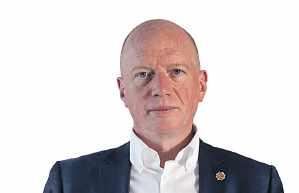

The Hostages and Missing Families Forum is searching for 59 London Marathon runners to dedicate their race on Sunday those still held in Gaza, writes Michelle Rosenberg.
Ahead of one of the biggest sporting events of the year, the volunteer-based organisation wants to hear from participants proud to wear a T-shirt personalised with the name of a hostage.
Nivi Feldman, co-leader of the Forum, told Jewish News: “The families of the hostages are deeply touched. They’re moved beyond
“At a time where Jewish teachers are dealing with a frightening rise in antisemitism in the workplace, they deserve a union leader who will prioritise their welfare.”
Labour MP Luke Akehurst added: “It is disappointing that the executive of
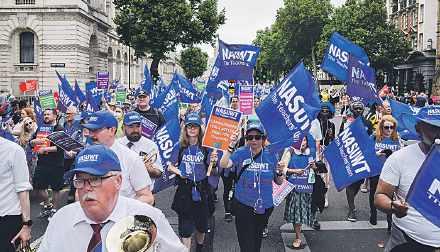
NASUWT has gifted a political resurrection to Matt Wrack with an uncontested election of a union leader representing a profession he has never been a member of just months after lost a democratic election in the FBU.
“I know many Jewish teachers who had first quit the NUT then the
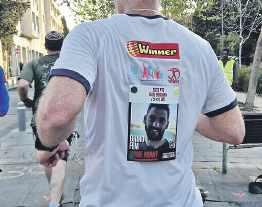
words that runners are choosing to carry their loved ones’ names across 26.2 miles — keeping their ongoing struggle in the public eye,
reminding the world they are not forgotten. Your steps are their hope. Thank you for standing with them.”
The 2025 London Marathon is on Sunday 27 April and covers 26.2 miles across the city. More than 56,000 runners are expected to take part.
To sign up to the Hostages and Missing Families Forum London Marathon WhatsApp group, visit chat.whatsapp.com/ FA9I82H2T KxGkNR4UknJHl
Gary Lineker has said the BBC “capitulated to lobbying that they get a lot” when it withdrew a documentary on Gaza over its links to Hamas.
The broadcaster was asked about his decision to join more than 500 media figures in a letter condemning the decision to withdraw the documentary Gaza: How To Survive A Warzone after it emerged that the child narrator, Abdullah, is the son of Ayman Alyazouri, who has worked as Hamas’s deputy agriculture minister.
Speaking to Amol Rajan he said he would “100 percent” support the documentary being shown again.
“I think you let people make their own minds up,” said Lineker. “We’re adults. We’re allowed to see things like that. It’s incredibly moving. I think [the BBC] just capitulated to lobbying that they get a lot.”
Lineker said he does not see Abdullah as a problem, and maintained that the corporation should not have admitted to “a number of
serious failings in their commissioning and editorial processes”.
He also defended his right to make political statements and queried the need for him to be “impartial”, saying he was a “freelancer”, and the rules were for “people in news and current a airs have subsequently changed”.
He added that this “left me, who always gave these honest opinions about things”, having to be impartial which, he said, “didn’t make any sense”.
NEU and moved to the NASUWT because of the politics of the former two unions. I hope Mr Wrack does not drag the NASUWT into militancy aimed at undermining a Labour government or into NEU style visceral anti-Zionism.”
Jewish News understands there
A former Labour MP who was suspended last year over comments he made about Israel is standing as a candidate for the party in next month’s local elections.
Graham Jones had been suspended ahead of the general election as the candidate for Hyndburn after comments in which he said “f**king Israel” and where he suggested Britons serving in the IDF during the war in Gaza should be “locked up” emerged in a recording of a meeting with local Muslim voters.
But Jones was informed by the party that his suspension had been lifted last May, and he is now standing as the party’s candidate for councillor in Accrington South, a seat on Lancashire County Council, in the May 1 election.
At the time of his alleged remarks, the Jewish Labour Movement said Jones’s alleged comments were “appalling and unacceptable”.
In a Facebook post Jones said he had been asked by the national party to stand in the seat, which is currently held by the Conservatives.
Other party sources insist Jones has received a standard email sent to members in an attempt to find a suitable candidate to stand.
Jones, the MP for Hyndburn from 2010 until 2019, had previously been known as being supportive of Israel, and had spoken out against antisemitism under Jeremy Corbyn.
are more than 1,000 Jewish members of NASUWT, which has tried to adopt a neutral political stance under previous leaders. Because of support from left-wing members of the executive, Wrack was confirmed on Tuesday as general secretary.
His appointment was immediately welcomed by the NEU’s Daniel Kebede, who is linked to the Trotskyist Socialist Workers Party.
Under Wrack’s leadership, FBU voted to re-a liate to the Labour party after Corbyn’s election as leader in 2015. He was a staunch ally of the former Labour leader.
When he was president of the TUC, lsenior figures repeatedly reached out to Jewish News to clarify that his views were not those of the main trade union body.
One Jewish member of NASUWT told Jewish News: “Wrack’s appointment is frightening. He does not represent us.”
Two new reports on antisemitism were published this week — one showing an unprecedented rise in antisemitic incidents in America, the worst in the last 45 years — and another saying that worldwide antisemitism has plateaued, though still remaining unacceptably high.
The New York-based Anti-Defamation League’s annual report says that the 12 month total for 2024 averaged more than 25 targeted antiJewish incidents in the US per day — more than one an hour.
The figures show 9,354 incidents of antisemitic assault, harassment and vandalism across the country in 2024. It is the fourth year in a row that the incidents increased, says the ADL. And, for the first time, 58 per cent of all the incidents related to Israel or Zionism.
In contrast, Tel Aviv University’s annual antisemitism report for 2024 says that the “antisemitic wave is calming”, and that “contrary to common perceptions”, the peak in global anti-Jewish hatred was immediately after the 7 October attack, and not as the war progressed.
Tel Aviv’s report, a global survey, says that a particularly alarming rise was recorded in Australia, with increases observed in America, Italy, Spain, Canada, Argentina and Brazil. The report notes that very few complaints relating to antisemitic hate crimes have led to arrests.
Emily Thornberry clashed with Natasha Hausdor , director of UK Lawyers for Israel (UKLFI), during a Foreign A airs Select Committee session over Israel’s conduct in Gaza, writes Lee Harpin.
Hausdor said the UK and US “have consistently said they do not have concerns about Israel’s approach to humanitarian law with respect to proportionality and targeting”. Thornberry responded, “Oh no, no, no, nah, nah, nah,” calling it “an extraordinary allegation.”
When Hausdor asked to finish her answer, Thornberry warned, “Be careful what you are saying.” Hausdor pushed back: “I have come here in good faith… I will answer this one with your permission?”
Thornberry said, “Answer this question accurately and with care.” Hausdor reiterated that the UK and US had not raised proportionality concerns, though she acknowledged other issues had been raised based on “incorrect information.”
Thornberry raised concerns over UK arms exports and possible
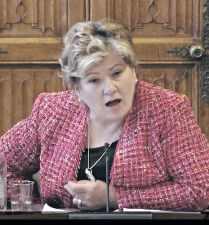
breaches of humanitarian law. Hausdor said that had “nothing to do with the arms that have been embargoed,” accusing the government of making a “political” and “deeply, deeply troubling” decision. She later claimed UK policy had “encourage[d] Hamas.” Thornberry appeared to mutter, “Delusional, delusional.”
Earlier, Thornberry asked Hausdor what a positive future for Palestinians looked like. Hausdor was given time to explain her view that
Israel has sovereignty over the West Bank and East Jerusalem — a stance opposed by the UN, ICJ, and UK government. Thornberry asked if Israel’s government believes its border stretches “from the river to the sea”. Hausdor replied, “It does not need to state that.” On Gaza’s future, Hausdor said she hoped for a “start-up culture” in the West Bank, Hamas’s defeat and an end to “indoctrination and incentivisation to terror.” Thornberry told her to stay “calm”.
Asked about aid blockages, Hausdor blamed Hamas for any food insecurity, claiming Israel had provided su cient supplies.
MP Abtisam Mohamed asked whether Palestinians have a right to a state. Hausdor said they do not, under international law.
Labour MP Alex Ballinger, a former British soldier, said it was “outrageous” for Hausdor to claim the IDF upheld the highest humanitarian standards.
Hausdor countered that senior UK military o cials had backed her view.
Tory leader Kemi Badenoch has condemned Irish rap group Kneecap for “glorifying evil terror groups” after a video of one of its members shouting “Up Hamas, up Hezbollah” from a 2024 concert in London appeared online.
Badenoch shared the video, put online by the Community Security Trust’s Danny Morris, on her own social media platform and slammed Kneecap writing:” “erhaps now Labour see Kneecap openly glorifying evil terror groups, they will apologise for rolling over. But I doubt it.”
A CST spokeswoman later said it was “utterly disgraceful” that Hezbollah and Hamas – proscribed terrorist organisations by the UK and other nations – were being “lauded from a London stage” with the crowd “encouraged to show their support.”
“We fully expect the police to investigate this thoroughly and take appropriate action,” they added.
The Metropolitan Police said it had been made aware of the video. “It has been referred to the Counter Terrorism Internet Referral Unit
for assessment and to determine whether any further police investigation may be required,” it said.
As business secretary, Badenoch had backed a legal challenge after Kneecap received nearly £15,000 in the Music Export Growth Scheme, which aims to promote British bands internationally and had been signed o by the BPI.
This was stopped, but the band won a legal challenge when ruled the British government discriminated against the group by stopping this funding.
Former 10cc frontman Graham Gouldman has said he was left stunned after Channel 5 News asked him to take o his yellow badge showing solidarity with Israeli hostages held by Hamas — saying he would have walked out rather than take it o , writes Adam Decker.
The rockstar, whose timeless hits include I’m Not in Love and Dreadlock Holiday, appeared on the channel last week to discuss the band’s concert at Hampton Court in June.
Gouldman told Jewish News: “I spoke with the presenter Dan Walker ahead of our interview. He politely asked, ‘What’s that badge you’re wearing?’
“I told him it was a symbol of solidarity
with Israeli hostages. The producer then asked me to remove my badge, citing Ofcom impartiality rules. I said no. He then said: ‘If you wear it we will to blur it out.’”
Gouldman’s interview aired during the channel’s 5pm bulletin with badge, which he had pinned to a black jacket, not visible to viewers.
A 5 News spokesperson told Jewish News: “Anyone wearing campaigning badges would be asked to remove them under 5 News’ Ofcom obligations to report impartially.
“These rules also cover advertising and other types of displays that would be considered to breach impartiality rules.”
Continued from page 1 Jewish News has been shown evidence of abuse directed at some of the 36 deputies signing the letter, published last Wednesday, on community Whatsapp groups with the slur “kapos” repeatedly used.
One response states: “Look, the letter isn’t my cup of tea. But the response from some has been deeply disturbing…. We should take it seriously when young Jews say they love and value our community even while voicing concerns.
“We should take care not to accuse people of being ‘kapos’ when in reality (at least some of them) are campus leaders who give a lot of time and energy to strengthen Jewish life.”
Jewish News understands that 36 deputies who signed the FT letter met this week to discuss their collective response to the launch of an investigation into their conduct by the Board.
On Tuesday, vice-chair of the international division Harriet Goldenberg was suspended from the executive as an investigation was launched, overseen by the Board’s Constitutional Committee.



Nat Kunin, vice-chair of the under 35s division, was also asked to step down from his executive role while the investigation is undertaken.
Jewish News has been shown the press release sent to national media last Wednesday to publicise the letter in the FT. The 36 describe themselves as “representatives of the British Jewish community leadership” and as “36 members of the Board of Deputies of British Jews”.
The press release adds the letter was signed by “almost half of its international division” and notes that in the past a motion expressing “grave concern about ministers in the Israeli government” passed with 83 percent support of deputies.
In his own social media post on Tuesday, Rosenberg appeared to compare his plight to that of Daniel in the Lion’s Den. He said his team had produced “an AI image of me as Daniel in the Lion’ Den” adding “a communal colleague remarked these were very tame looking lions”. Rosenberg thanked “all who have been checking in”. Editorial comment, page 18
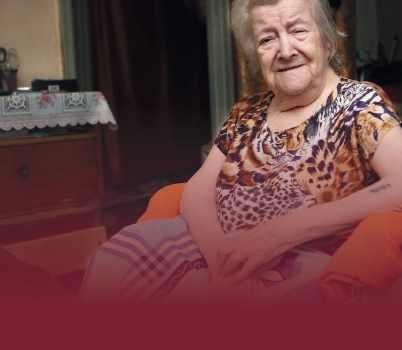






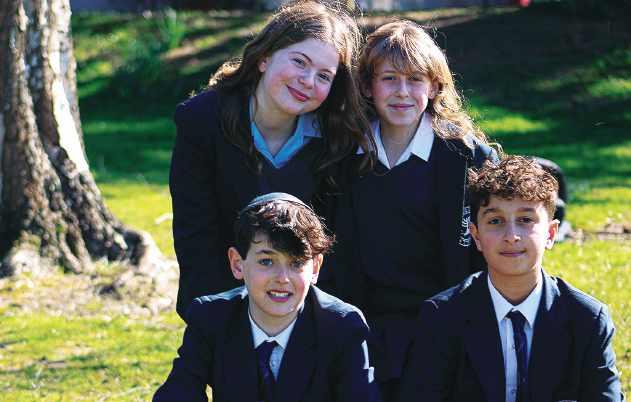
by Annabel Sinclair annabel@jewishnews.com
Senior Reform and Liberal rabbis claim trans Jews are already fearful for their safety following last week’s landmark Supreme Court decision defining sex and womanhood in legal terms as biological.
The judgment, delivered unanimously last week, clarified that the words ‘women’ and ‘sex’ in the Equality Act 2010 refer to biological sex, rather than to gender identity or the possession of a Gender Recognition Certificate.
Campaigners backing the case say it now strengthens the right of singlesex services to exclude trans women, even if legally recognised as female under previous interpretations of the law. Baroness Falkner, chair of the UK’s Equality and Human Rights Commission, said the ruling had ensured clarity, and meant that trans women could no longer take part in women’s sport, be on singlesex wards and that changing rooms “must be based on biological sex”.
But Jewish clergy have condemned the ruling’s impact on
the trans community, saying it will increase discrimination and mental health risk.
In a joint statement to Jewish News, Rabbi Anna Wolfson, cochair of the Conference of Liberal Rabbis and Cantors, and Rabbi Robyn Ashworth-Steen, co-chair of the Assembly of Reform Rabbis and Cantors, said: “This ruling is about real people. Trans people are not theoretical case studies. They are our friends, congregants, colleagues and family members.”
They added that rabbis and cantors across the UK were already being contacted by trans members of their communities expressing fear.
“It is vital that our Jewish communities remain safe and inclusive spaces and continue to support our trans and queer members, who will now be at greater risk of discrimination, harm, mental health challenges and suicide,” their statement said.
“We reject all notions that trans rights are anything other than human rights. This ruling not only a ects our transgender members and their families and friends; it impacts all of us.”
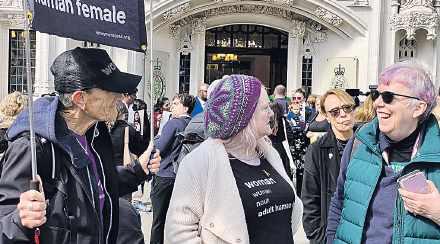
The court’s decision stems from a challenge brought by Nancy Kelley, the former CEO of Stonewall, and focused on the interpretation of sex in the Equality Act. The legal arguments explored whether “sex” should be understood according to gender identity where a person holds a GRC. The court concluded that for the purposes of single-sex services and protections under the law, sex must be interpreted as biological. The ruling will now apply to settings such as women’s refuges, hospital

BY DR SHIRA SOLOMONS & RABBI ZVI SOLOMONS
Last week’s ruling was a welcome clarification of the law for many, but for others has been a source of anxiety.
Historically Orthodox Judaism has responded poorly to issues of sex and sexuality, but it is a mistake to try to rectify the sins of the past by piling more errors upon errors. As Jewish professionals, our initial response must be nuanced and sensitive, as well as faithful to our halachic values and current science. We cannot take a simple line but there are three principles to balance here:
1. Inclusion: we never say to someone “You are the wrong kind of Jew, go away.”
2. Realism: we cannot function legally if categories such as ‘man’ and ‘woman’ have no clear meanings.
3. Halachic integrity: Our texts essentially view every human being as science does, either male or female, and where these two categories appear blurred, attempts to determine a definition for halachic purposes.
We find the intervention of Rabbis Jeremy Gordon and Natasha Mann of the (Masorti) New London Synagogue in this matter to be unhelpful, possibly even harmful to Jews in our community who experience gender distress.
Rabbis Mann and Gordon write based on a teshuvah by Rabbi Leonard Sharzer of the US Conservative movement, written in 2017 before
the harms of medical transition were widely known. This teshuvah rejects realism and is based on the now-discredited claim that humans are born with a fixed gender identity, and that when this is not aligned with sex it is crucial to align the body with the gender identity to alleviate the gender dysphoria. Sharzer repeats the now-debunked claim that such transition protects people against suicide. We now know that if anything, medical transition makes suicide more not less likely and has no documented mediumor long-term mental health benefits.
Gay and lesbian Jews are being thrown under a bus. It is disproportionately they who are being sent to doctors to have their bodies changed and their sexual pleasure, function or fertility removed. As the Orthodox American Rabbi Aryeh Klapper has observed, one reason why one must be absolutely clear that no one can change sex, either biologically or halachically, is that if you give people any hope that they can do this, some impressionable, desperate and distressed people might take you at your word, to their permanent detriment.
It is not always easy for Orthodox communities to include non-stereotypical people, but halacha is more flexible than people may imagine. We must reject simple solutions such as making believe that people can change sex. They cannot.
wards, changing rooms, rape crisis centres, and sporting categories.
Writing in its conclusion, the court stated: “Read fairly and in context, the provisions relating to singlesex services can only be interpreted by reference to biological sex… It is fanciful (even perverse) to think that any reasonable objection to the presence of a person of the opposite sex could be grounded in GRC status.”
Campaign groups including the LGB Alliance and Sex Matters hailed the judgement as a major victory
for common sense and the rights of same-sex attracted individuals.
Kate Barker, CEO of the LGB Alliance, claimed it marked “a watershed for women”, especially lesbians, saying, “The ruling confirms that the words ‘gay’ and ‘lesbian’ refer to same-sex sexual orientation and makes it absolutely clear that lesbians wishing to form associations of any size are lawfully entitled to exclude men – whether or not they possess a GRC.”
Kemi Badenoch, Conservative equalities minister and party leader, celebrated the decision as a vindication for women who had “faced personal abuse or lost their jobs for stating the obvious”. She said, “Women are women and men are men: you cannot change your biological sex.”
Meanwhile, former SNP MP Joanna Cherry KC said politicians must now ensure that public institutions act in line with the clarified law, stating, “There will have to be a seachange across the public sector to recognise the law has been clarified in the ruling.”
Letters, page 18

BY ANONYMOUS
I’m Jewish through and through. I’ve a deep love for our community – it’s why I spend my days at work serving it. I’m nonbinary. Always have been. Always will be.
This article is anonymous. Anonymous for a reason. After such a disturbing week for the trans community, I have witnessed truly sickening hatred directed at trans people –a group I belong to – coming from the very Jewish community I live to serve. Why? That’s a question I often ask myself.
Last week, the Supreme Court ruled that under the Equality Act 2010, sex is defined strictly by biology.
The ruling prompted high emotion from many sides. What struck me most was the difference in emotional reactions. On BBC Radio 4’s World at One, a self-described gendercritical feminist described the crocodile tears of joy she shed upon hearing the court’s judgment. That interview was swiftly followed by one with the CEO of a trans advocacy organisation, who is trans herself. She said her reaction to the news was to bring her breakfast back up out of fear. Not fear of the immediate, but fear of what may come next — fear of the unknown. Some may call that paranoia, but paranoia of marginalised groups often comes from a place of truth.
Don’t fool yourselves. Just because the
Supreme Court has seemingly sided with a certain brand of feminism — the kind that would have Jewish feminist icon Ruth Bader Ginsburg spinning in her grave — doesn’t mean this ends here. Those who seek to strip away the rights of one tiny minority won’t stop now that they’ve removed this first stage of bodily autonomy.
So, why do I think there are so many loud Jewish voices being unashamedly transphobic? Sinat chinam – baseless hatred – comes to mind.
The Jewish community, rightly, is up in arms whenever the media misreports on Israel. But when those same organisations treat an even smaller minority group with the same contempt, what do we hear? There is an even louder silence from groups that normally rush to wave the “Israel is the only country in the Middle East where you can celebrate Pride” flag. Hear this the next time you use that lazy line while attacking the very members of our community you parade around to score points with people who will never listen to you anyway: pride is a protest — always has been, always will be.
This year, at Pride, I’ll be saying loudly that trans women are women, trans men are men, and non-binary people exist. An attack on one is an attack on all.
UK universities that commit to tackling antisemitism will be eligible for a new gold standard accreditation scheme starting this autumn, writes Michelle Rosenberg.
The initiative is being launched by the Intra-Communal Professorial Group, the organisation chaired the lawyer Prof Anthony Julius, to research, record and analyse the experiences of Jewish students, academics and staff on campuses.
The project is aimed at incentivising concrete action to tackle antisemitism and provide a benchmark for adaptation in other countries.
Grant funding has been secured for the first phase: a legal research project to assess 50 universities and provide ten in-depth case studies.
Following a review, the ICPG will draft a full report and create an interactive toolkit to help students to decide which universities to apply to.
Julius, chair of the ICPG, said: “Securing charitable status means that we can develop our mission, conceived during 2024, and prompted by the hostile responses in universities to the 7 October 2023 horrors. The ICPG will be a critical friend to university leaders giving them the tools, knowledge and support to enforce a zero-tolerance policy against antisemitism on campus.”
Rosa Freedman, professor of law, conflict and global development at the University of Reading and ICPG deputy chair, said the group had, for the first time,provided a “like-

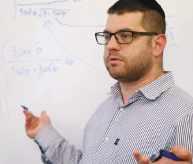

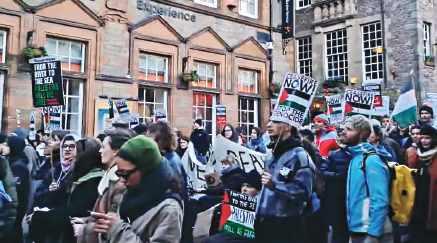
minded community of academics, a safe space to discuss antisemitism with others who understand the university context, and the hope that together we can deliver positive change. “Many of our members have
become the ‘go-to person’ for their university leadership and students on issues faced by the Jewish and Israeli community on campus. This has become a vital role for them and for the membership.”
The ICPG is made up of 25 academics from universities including Cambridge, Oxford, the London School of Economics and Reading.
A year since its launch, it has now gained charitable status and increased its membership to 80 people from 35 institutions, representing about a fifth of UK universities.
The Anti-Defamation League also publishes an annual campus antisemitism report card that grades colleges and universities on their efforts to combat antisemitism.
The largest education union in the country has passed a motion labelling Reform UK a “racist and far-right” party that is “scapegoating Muslims, Jews and others who do not fit their beliefs”.
Delegates at the conference of the National Education Union in Harrogate (pictured) also called for the NEU’s political fund to be used to campaign against Reform UK election candidates whose policies and campaigns were “racist”.
The passed motion said it believes Reform UK is racist “because of its policies around immigration and its campaigns against migrants”. It said the party founded by Nigel Farage “seeks to build on the despair, poverty and alienation in our society by scapegoating refugees, asylum seekers, Muslims, Jews and others”.
Daniel Kebede, general secretary of the NEU, has repeatedly faced criticism of pursuing an
extreme anti-Israel agenda. In 2021, he appeared at a pro-Palestine rally in Newcastle and told those in attendance: “It’s about time we globalise the intifada.”
At this year’s NEU conference another motion on Israel was passed. Commenting on the motion’s repeated condemnation of Israel’s war in Gaza, Kebede did stress the need for the hostages still held by Hamas to be released.





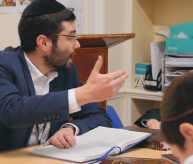





After losing both legs in Gaza, Elisha Medan arrives in London, bringing inspiration to everyone he meets, writes Debbie Collins
They say never meet your heroes, but in the case of Elisha Medan, his story touches everyone he meets.
In March, charity Beit Halochem brought wounded veterans to London for a week of entertainment, to lift their spirits and meet the UK community.
Wheelchair-bound with both legs missing, it’s impossible to ignore Elisha’s stumps, often placing his hands underneath them, you would think out of nervousness or to warm his hands. But as Elisha explains: “I hold my stumps because I have phantom leg pains. I move them to tell my brain, ‘it ends here’.”
With tanned skin and a boyish grin, Elisha belies his 45 years, an observant Jewish father to six children: 17, 15, 13, 11, 8 and 4. Describing life in Israel he says, “I’ve been married to my amazing wife for 18 years – a strong Israeli woman. I did 19 years duty and was always called for reserve duty. I was a navigator –always the first, so you need good sense of direction, learn the maps, walk the mountains. Everyone is carrying heavy stuff, relying on you for the best route.”
His story begins like so many others on the morning of 7 October 2023. “My wife and I were at home and woken early. We live in the south and always hear sirens but this felt different. My second officer called to say ‘Come to base – we have a war’, but then my friend called from his kibbutz [Nir Oz] saying terrorists were trying to get into his wife’s sister’s house. I decide I am going to go and help them instead.”
Whereas most would check with their spouse before heading straight to danger, Elisha had confidence in his wife’s response. “She said ‘go’. I took my private pistol and a friend joined me.
“Driving there was chaos – just dead bodies all over the road. We saw a lot of police and army cars but everyone dead, like an apocalypse. We arrive to Sderot and spot terrorists so we take another street.”
Wearing his army uniform but with no helmet or vest, Elisha reaches a citizen building and tells his friend to wait in the vehicle in case of a speedy escape. “I go inside where a soldier asks me how many we are. I explain it is ‘just us two’ and he gives me a bloodied gun and an address in Sderot to go and stop the terrorists. He has no one else alive to send. When we get there, it’s just dead bodies so we go looking for the terrorists, where we are fighting them and killing them, until my unit arrived to help.”
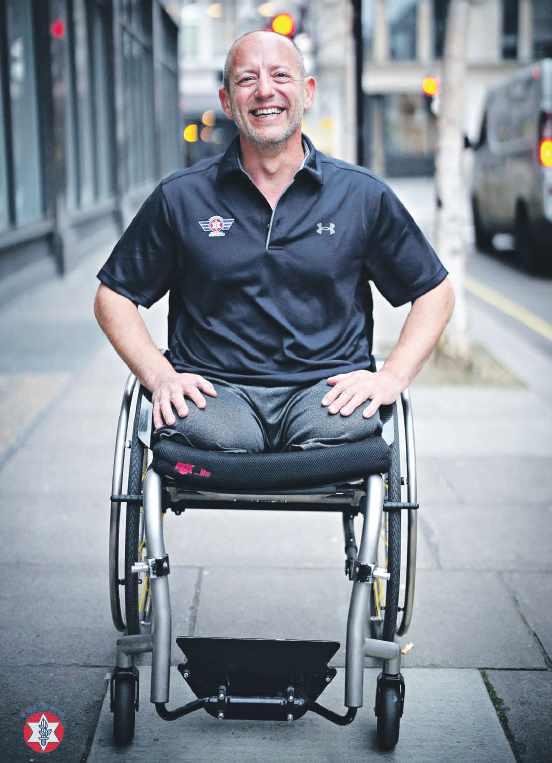
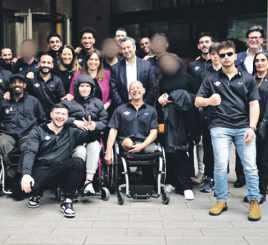
Despite the intensity of fighting, Elisha remains uninjured, either through sheer luck of years of training. “We felt part of something big, fighting for our brothers and sisters all over the world and our zechut (our privilege) to live in Israel.
“We always felt the great hug that you [the diaspora] give us. After three weeks my com-
mander tells us are going into Gaza. And for two weeks it was like a war movie.”
Having served for many years in the IDF, Elisha’s memory is sharp as a knife, but he explains that the fighting in Gaza seems different, more intense than all his years in service, including the Lebanon war. “We got intel that Hamas are tracking us, so my team decide to try to find them first. We get inside this house but they saw us through a remote camera and pushed the button – suddenly it was a big explosion, like a car accident. I was injured all over, lying with my best friend Yossi next to me, both of us without our legs, trying to breathe. He’s my ‘metal couple’, like my brother since kids - you
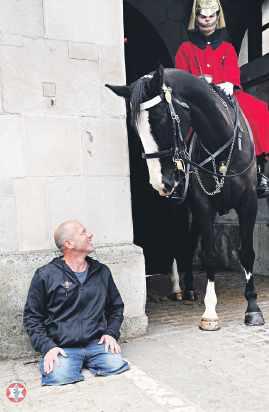
don’t ever leave your metal couple but after 20 minutes, he died. Eventually I was rescued after two hours of digging. There were 10 of us – four killed, six injured, with my injuries probably the most severe. I was in critical condition in the hospital but after much surgery I woke up and see my wife there. And she tells me what happened to my unit. To me. That I lost my legs.”
When Beit Halochem offered its services, Elisha stubbornly refused, but after meeting a fellow veteran things changed for him.
“In the beginning I didn’t want help, but then I met ‘Rosi’ [Roei Rosenberg] and started playing wheelchair basketball and tennis, which I never even played before. The aggressive play is good for my soul and mind.” Sagi Dovev, a Resilience Expert working with Elisha says: “With Elisha it feels different. Like he is the one giving me the lesson. Each time I train him I feel like there’s another level to his resilience and he never feels sorry for himself.”
With the ongoing conflict playing out, Elisha remains positive. “I choose to look at the bright side of life with good energy and good spirits. I don’t watch or listen to the news. I just wish to be a good father and husband. I want to do more lectures to inspire people. I got prosthetics fitted and walked well but it’s difficult without knees, so I will have more surgery and physio training and then start again and I will walk.”
Had Elisha decided not to go towards the fighting on 7 October, his outcome could have been a very different one and raises the ‘why me’ question. “I know the answer. I chose to fight. But I feel so lucky that I am alive.”


















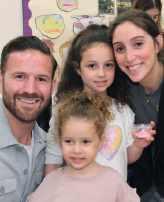





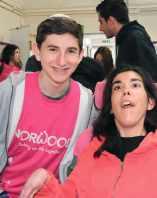











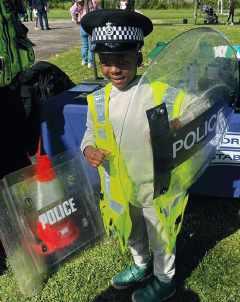









Sponsored Bike Challenge
11.30am (suitable for ages 4 – 11) £15 Registration (includes free entry to Carnival)
The Norwood Carnival 12.30pm – 4.30pm £6 per child - £4 per adult Carers go free (one carer per family)















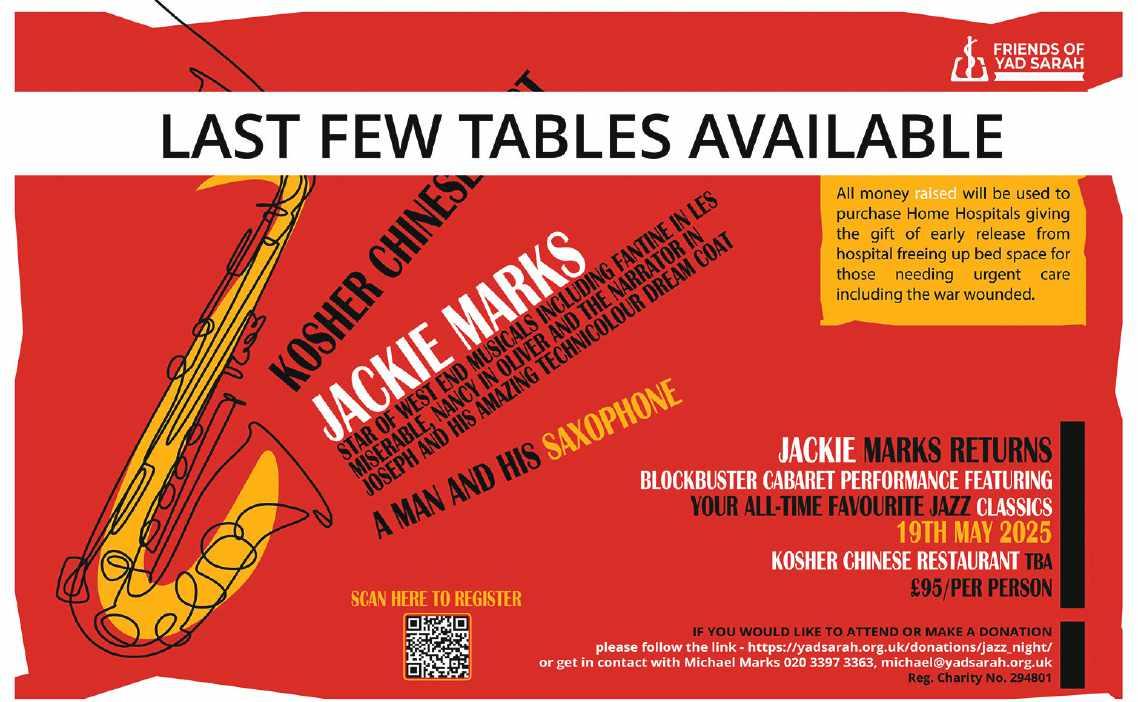
• Tax-efficient investing before and after Aliyah
• Tax-efficient income after 10-year tax-free period
• Receive your entire pension pot tax-free
• Specialist portfolio management for Olim
• No Inheritance Tax (for non-UK-situated assets)
We are seasoned experts in providing long-term financial planning advice for those making Aliyah. Scan the QR code to read more
With investing, your capital is at risk. Tax treatments are subject to individual circumstances and are subject to change.

Eve Kugler / Kidney appeal / Refugee honoured
The Shoah survivor Eve Kugler has died, aged 94. A passionate Holocaust educator, German-born Eve had recently attended Jewish Care’s Holocaust Survivors’ Centre annual dinner, sharing memories as she sat beside fellow survivor Mala Tribich.
Kugler was just seven when Nazis broke into her home on Kristallnacht.
She recalled: “The Nazi soldiers came into our house, and I watched with my sister as they ransacked our home, and dragged my father and grandfather away in the middle of the night.
“That night the synagogue my grandfather helped build was burnt to the ground, while the fire brigade stood and watched.”
She escaped Nazi-occupied Europe to the United States in 1941, and worked as a journalist before moving to London in 1990. She was awarded a BEM in 2019 for services to Holocaust education and spoke to thousands a year through the Holocaust Educational Trust.
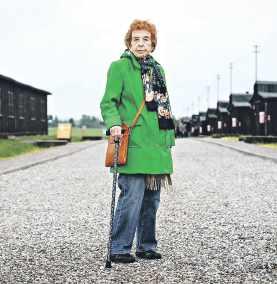
She was immortalised in bronze by the sculptor Frances Segelman in 2023. Writing in tribute, educational group March of the Living UK said: “The March of the Living family are devastated by the loss of our dear friend and Holocaust Survivor, Eve Kugler BEM z”l. Eve has been travelling to
Poland with March of the Living UK since the very beginning.
“She has spoken to thousands of participants and her testimony has inspired generations. We have been privileged to accompany Eve back to her home town in Germany, to facilitate the laying of Stolpersteines for her family and we even took her on a historic visit to Dubai where she spoke on the anniversary of Kristallnacht.
“Apart from being the incredible educator she was, she was a friend and family to many of us. Her zest for life was infectious and she lit up every room she was in. There is an ache in our hearts that words cannot fill but our commitment to telling her story will remain at the forefront of everything we do.”
Karen Pollock, chief executive of the Holocaust Educational Trust, described Eve as “the epitome of strength and determination and lit up every room – she had an infectious smile and a cheeky wit”.
A Jewish woman who escaped Nazi Germany as a child and became a wartime RAF mechanic has received two medals for her service, more than 80 years after joining Britain’s air defences.
Ruth Klauber, born in Frankfurt, was nine when her family fled to Britain following Hitler’s rise to power. Now aged 101, she has been awarded the UK War Medal and UK Defence Medal in recognition of her work with the Women’s Auxiliary Air Force.
Klauber’s decision to enlist came in 1941, two years after Britain entered the war. Although she was o ered more traditional women’s roles at the time, including cook or batwoman, she opted to train as a flight mechanic. She told the Daily Telegraph: “I could have been a cook… and I thought, no thank you. They said, ‘Well, you can be a flight mechanic.’ And I thought, this would be interesting. I’ll go for that.”
Following training in welding, hydraulics and woodworking, she was posted to RAF Sleap in Shropshire. There she inspected, repaired and refuelled Wellington bombers before moving on to larger Halifax and Lancaster planes used in Allied campaigns over Germany.
Her background as a Jew from Germany never raised concerns, she said. “They didn’t know my history. I was entirely for this country. Never for a moment did I have any regrets about not being back in Germany. I refused to speak German during the war.”
Klauber credited her father, Benjamin Bendix, with recognising the danger Hitler posed. “He read Mein Kampf,” she said. “He believed the man meant what he said.”
The family left Germany the day after the 1933 election, travelling to Belgium before settling in the UK. “A lot of people thought it would
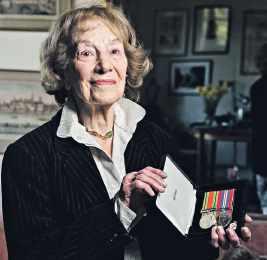
blow over,” she said. “I’m forever grateful to my parents for taking the longer view and not being seduced into that way of thinking.”
She recalled the day they left: “It was all very tense. We weren’t really allowed to speak. I remember feeling that I would never be happy again.”
Despite her contribution to the war e ort Klauber never applied for medals at the time, believing her role was not exceptional. “I felt it was very important to make a contribution towards the war against Hitler and the Nazis. I didn’t think I felt that all this required medals.”
Her daughter, Sue Klauber, recently contacted the Association of Jewish Ex-Servicemen and Women to see if her mother was still eligible, and she received original versions this month.
The former psychotherapist has since been invited to No. 10 Downing Street and Buckingham Palace in honour of her service.
‘ARE YOU ABLE TO FIND ME A
A long-standing member of Enfield & Winchmore Hill United Synagogue who has stepped in to lead services following the retirement of its rabbi has issued an urgent plea for a kidney donor, writes Annabel Sinclair.
Aryeh Goldberg, 62, has just 15 percent kidney function remaining and faces the prospect of dialysis three times a week unless he can find a suitable live donor.
“I was born with only one kidney, and it is now working at only 15 percent,” he told Jewish News. “That means I will now need to have a kidney transplant.”
A volunteer emergency responder and qualified health and safety trainer, Goldberg has dedicated his life to helping others and is now asking for help in return. “I run a training company where I teach people how to save lives. I now need someone to help save mine.”
Goldberg, a member of the Enfield community for nearly 25 years and currently covering all Shabbat and Chagim
services in the absence of a rabbi, said he has continued his duties. However, his condition is deteriorating and will soon make it impossible to maintain his schedule.
“If I have to go on dialysis –which is probably going to be three times a week – I’ll also need a day to recover after each session,” he said. “That will probably leave me with just one day a week where I might be able to function properly. It’ll impact my work, my volunteering, my ability to go to shul and conduct services – my whole life, basically.”
Three of his 13 grandchildren have inherited his condition, making them unable to donate. “My own family would not be able to help out,” he said. “So, I am looking for someone from the wider community who may be willing and able to donate a kidney.”
• If you are interested in being a living kidney donor for Goldberg, please contact the transplant team on 020 7317 7604 or email rf-tr.rldn@nhs.net


St John’s Wood Tigers of the Maccabi Masters Football League are looking for new quality players between the ages of 40-50 for the forthcoming season 2025/26.

PLEASE APPLY TO John Perloff on 07976 337799 or jhp555@outlook.com”
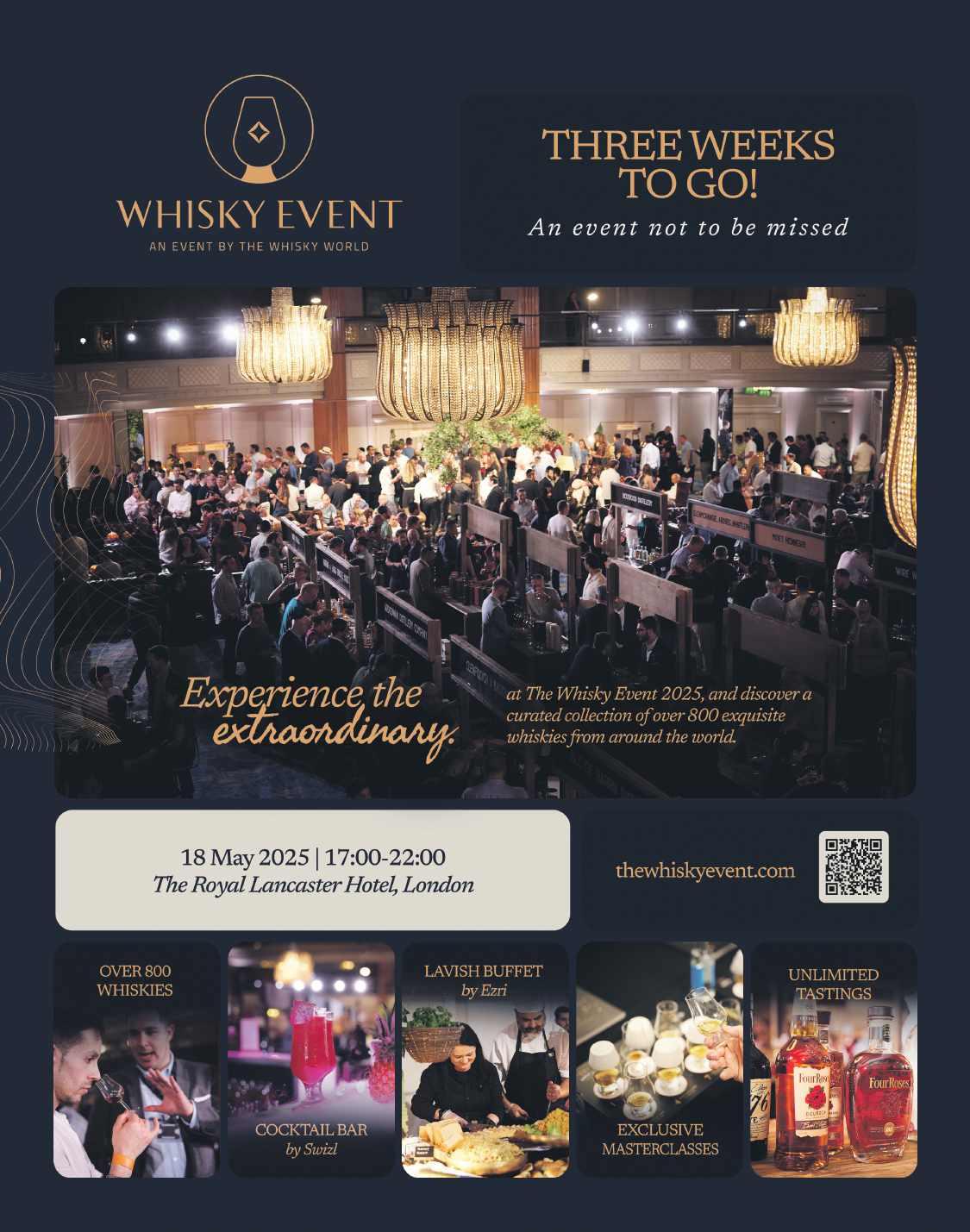
A mum-of-three has revealed she received the ‘shock of her life’ after her son was diagnosed with a rare and aggressive brain cancer, as a fundraiser to support the family has now reached more than £12,000, writes Sarah Miller.
Ra Starkowitz (pictured), aged three, from Bushey, Hertfordshire, has already undergone major surgery at Great Ormond Street Hospital to remove a tumour and now faces months of intense treatment including chemotherapy and radiotherapy. Cancer specialists diagnosed Ra earlier this month with large cell anaplastic medulloblastoma, an extremely rare subtype of the most common malignant brain tumour found in children.
Concerned parents Nicky, a paediatric nurse at Northwick Park Hospital in Harrow, and Neil, an IT project manager, say they are taking each day ‘step by step’ as a family friend is gearing up to run an ultramarathon from London to Brighton to raise financial support for them.

anaesthetist Jamie Gross, who works with Nicky and is also from Bushey, is set to run an epic 100km next month. Every penny he raises will go towards easing the burden for Nicky and Neil who face having to take months o work while also paying for medical expenses and additional care for their two older daughters, Ella, 10 and Talya, seven.
Nicky said she was especially taken aback by the speed at which the large tumour has grown, with doctors believing it had only been there weeks, not months, before the youngster began showing symptoms on March 31.
She told Jewish News: ‘The day before we found anything out he was playing rugby and running

around. But while we didn’t say it to each other, Neil and I both thought his motor skills looked a bit off at points through the day.
‘Ra was helping Neil wash the car and he thought he looked a bit clumsy but dismissed it because he was wearing wellies.
‘Then the next day after Ra was dropped o at nursery, they called within an hour to say he looked a bit wobbly. I thought it might have been an ear infection or post-viral symptoms, so I took him to the GP but after looking Ra over they told me to go straight to hospital.’
Nicky took Ra to Northwick Park, where one of her colleagues checked him. When she was shown a video of how he normally walks compared to how he was that day, the doctor recommended blood tests and an MRI, which eventually showed that he had hydrocephalus, a fluid build-up on the brain, as well as a sizeable abnormal mass measuring around 5cm. Within 48 hours, Ra ’s symptoms had progressed to him
being sick, unable to walk or sit up and becoming extremely drowsy.
Five days after his symptoms first began, Ra was transferred to Great Ormond Street Hospital, where he underwent an eight-hour operation to remove the tumour.
‘It all happened so quickly, within just five days. While he was in surgery we had no idea what kind of tumour it was, if it was benign or cancerous.
‘When we were told it was a medulloblastoma that would have been enough of a shock, but then we were told he had a very rare form of it and we were having to deal with that.”
Only 52 children in the UK are diagnosed every year with medulloblastoma, including just a handful of those with the same rare subtype that Ra has. While Ra ’s tumour has been removed, Nicky will take time o work as he faces nine months of intensive treatment that will require
To support the family, visit Donate to Run for Raffi













Editorial comment and letters to the editor
The communal rift caused by 36 members of the Board of Deputies publicly condemning Israel’s war in Gaza rumbled on this week with two suspensions handed out by the Board’s executive in the wake of the letter in the Financial Times
Critics of the letter – and there are many – have questioned not only its substance but how it was delivered. The press release suggested that these signatories were more influential than they are. Misleading headlines added to the confusion, prompting the Board’s leadership to clarify that the letter did not reflect the views of the wider body.
Writing in today’s Jewish News, the Board of Deputies’ president, Phil Rosenberg, underlines that the organisation will continue to represent the majority rather than few who signed.
Deputies are elected by synagogues and charities so they speak for more than just themselves, but many of the deputies hadn’t consulted their constituencies.
Some potential signatories backed out after failing to secure local support.
Even staunch defenders of Israel acknowledge growing unease. Many in the community are troubled by civilian suffering in Gaza and the war’s duration, even if they don’t back the letter’s tone. Younger Jews, in particular, are more likely to voice public criticism, as past polling has shown.
Yet, while grief for Gaza’s innocents runs deep, so too does fear for relatives in Israel – and the sense that only Israel can eliminate Hamas, which still holds hostages and remains openly committed to further violence.
In Israel, the debate about the rights and the wrongs of Israel’s war is played out in full view.
Here in the UK, the pressure to present a united front often silences any dissent. That tension now marks the fault line splitting British Jewry.
I was deeply disturbed to read that a British law firm is representing Hamas — a proscribed terrorist organisation responsible for some of the worst atrocities of our time. It beggars belief that any solicitor regulated by the Solicitors Regulation Authority (SRA) could defend such a client and still claim to uphold the values of the profession.
The SRA rightly prides itself on maintaining standards of integrity and public trust in the legal system. But surely that trust is undermined when lawyers choose to act for barbarians like Hamas.
There is a profound difference between defending an individual accused of a crime — however serious — and agreeing to act for an organisation whose very purpose is violence, antisemitism, and terror.
It raises uncomfortable but necessary questions: How can lawyers who represent Hamas possibly claim to be upholding justice? Should such individuals remain in good standing within a profession that demands not only legal
Following last week’s ruling by the Supreme Court’s that sex in the Equality Act 2010 refers to biological sex, the Assembly of Liberal and Reform Rabbis put out a statement that could have been written by Stonewall.
The rabbis appeared not to be able to bring themselves to welcome the clarity the court judgment brings, a clarity all mainstream bodies have welcomed.
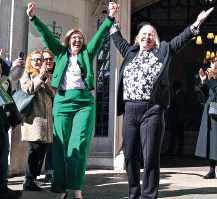
More worryingly, those rabbis, who represent more than 80 synagogues in the UK, including mine, were silent on the women and men whose belief that changing sex is not possible has led in recent years to them being bullied or sacked.
The highest court in the land has vindicated For Women Scotland and yet the only people for whom the rabbis show concern are trans people.
Parroting mantras including “trans rights are human rights”, the rabbis say: “This ruling not only affects our transgender members ... it impacts all of us. None of us are free until all of us
are free.” Yet the judgment has at last freed women who have been sexually assaulted or intimidated by a man from being given intimate care by or being strip-searched by a male. The deep relief felt by women who need and want single-sex spaces was ignored.
Incredibly, the progressive rabbis are backing a return to sacrifice: sacrificing the rights of women in order to appease angry males, some of whom on Saturday responded to the judgment by vandalising a statue of the suffragette Millicent Fawcett, urinating in public and threatening to defecate on females. The court has given its judgment; the Liberal and Reform rabbis appear to lack any judgment. Every one of them is aligning himself or herself with men threatening violence towards women. When will they issue a statement in support of the women who have fought for common sense and decency to prevail?
Emily Horowitz By email
You state (10 April) that barring entry to two Labour MPs known for their agitation and obsession against and about Israel, abusing their democratic mandate in the House of Commons to do so, risks undermining Israel‘s own democratic values.
But that is exactly what the UK and other western democracies have done by barring entry to those they deem of an undesirable political bent, even without seeking to undermine this country.
Geert Widers and Moshe Feiglin spring to mind under previous Labour governments, as well as attempts by the previous Labour opposition to prevent the leader of the free world, President Trump, from entering Britain.
These two newly elected Labour MPs did not come on the fact-finding mission, but rather to undermine and harm Israel during an existential war that Israel is forced to fight.
It is telling that they did

skill but moral responsibility? What darkness within them motivates such behaviour?
The public deserves a clear answer. Are there any limits at all to who our legal profession will represent?
Sidney Karman
Leeds
not take up Israel’s offer of an appeal in a court of law, because they knew that their nefarious objectives would be exposed.
Rather than taking the moral high ground at no cost to yourselves from the safety of the -Diaspora, you should support and defend Israel. There is always a sea of unjust criticism against our tiny nation state. You don’t need to add your voice to it.
Warren S Grossman
Leytonstone
CAN YOU HELP AJEX?
AJEX is seeking families of the following two men with a view to having a Star of David put on their graves, instead of a cross or no emblem: Lewis Feldman RA, born Spitafields, KIA 7/11/18, brother of Barnet Feldman; and Pte I Snook, MGC, buried in a war grave at Marlowe Road, Jewish cemetery, London.
Please contact me via Jewish News if you can help.
Martin Sugarman AJEX archivist
BEEN THERE, NU THAT!
Jenni Frazer wrote: “This autumn YIVO, in conjunction with a leading American university, will offer the world’s first master’s degree programme in Yiddish language and civilisation.” There are two masters courses in Yiddish that I know of. One is at Oxford University and the other is at the Heinrich Heine University in Düsseldorf. Zay gezunt!
Michael Rosen By email
Members of the Board of Deputies wrote to the Financial Times disassociating themselves from the policies and actions of the government of Israel. As one is a member of the Board only as a representative of a member organisation, can we know which organisations these people belong to and whether they consulted with those they represent before signing the letter?
Shimon Cohen
N2
There seems to be one outstanding question that, as far as I am aware, has not been raised: what was the purpose of the letter in the FT? What were those who signed it trying to achieve?
If the purpose was to alter the opinions of fellow Jews, the vast majority of whom would have a different view of the matter, then that purpose would be best served by a letter to a Jewish news outlet such as this one.
But it was a letter to a secular newspaper, one probably not read very widely in the Jewish community. As such, I can understand their letter only as an act of virtue signalling to the non-Jewish community.
Professor David Ruben University of London
I condemn those deputies who, out of naivety, cowardice and fear, sent an accusatory letter to the FT. It could have been written by the editors of Al Jazeera or their comrades-in-arms Haaretz
Did they think at all of those in the community with family or friend in Israel whose relatives were cruelly and evilly slaughtered, or who are actively fighting the murderous terrorist organisation Hamas? Has any of them actually lived, worked, paid taxes in Israel, or served in the IDF? If not, it is not for you to condemn and offer your words of false wisdom. I am appalled by your actions.
Martin Cohen
By email
The open letter from a handful of members of the Board of Deputies published in the Financial Times shows UK Jewry exactly the kind of people who now run our leadership organisations.
It blatantly breaches the Board’s own rules for deputies, but you can be almost certain that no serious action will be taken.
While Israeli parents are sending their teenagers off to defend the Jewish state from murderous
terrorists, these Hamas apologists, sitting in their comfortable, safe homes, are playing into the hands of Jew haters here in the UK.
They are a disgrace and a danger to us all.
The vast majority of UK Jews know exactly where the blame for the past 18 months of suffering lay – squarely at the feet of the Hamas terrorists. These 30 or so deputies represent nobody but themselves.
There is another democratically
In all the angst over “that” letter, a major issue has been missed – just how representative is the Board of Deputies? The answer is simple – it isn’t.
About only 160 synagogues in the UK out of 450-ish are affiliated, as well as between 20 and 30 charities and other organisations. Many of the supporters of these organisations are already members of the synagogues that are affiliated. These organisations/charities also include the umbrella bodies and youth movements of the synagogues already represented on the board. The sooner people are disabused of the notion that the board in any way represents most of UK Jews the better. Perhaps another way of advocating for British Jews is needed. A PR firm perhaps?
Joe Millis Former BoD deputy
elected body that needs to be the voice of UK Jewry and Zionists.
The forthcoming ZF UK elections offer the opportunity to vote in a strong, unapologetic voice to the oldest Zionist Federation in the World.
Register now at UK.eventmagix. com for the opportunity to vote for Ze’ev Jabotinsky’s Israel in the forthcoming elections.
Damon Lenszner Herut UK
We cannot underestimate the sense of disgust and outrage among Jews loyal to the state of Israel as a result of the letter sent out by those 36 deputies. We should never publicly denounce or criticise Israel in the manner expressed in their letter. It plays entirely into the hands of our enemies and those ignorant of the facts.
If these deputies have Israel at heart, I say to them come and live here and see what is really going on. We do not need to be reminded how our families continue to suffer, with great resilience, the hell of waiting for the return of hostages and the worry over the safety of our beloved ones.
I applaud the president of the Board Of Deputies, Phil Rosenberg, for his excellent response. Nevertheless, I believe stronger action should be taken against people who purport to care deeply about Israel but who have caused tremendous untold damage in our aim for peace in the Middle East and especially in our beloved Israel.
Flora Frank Israel
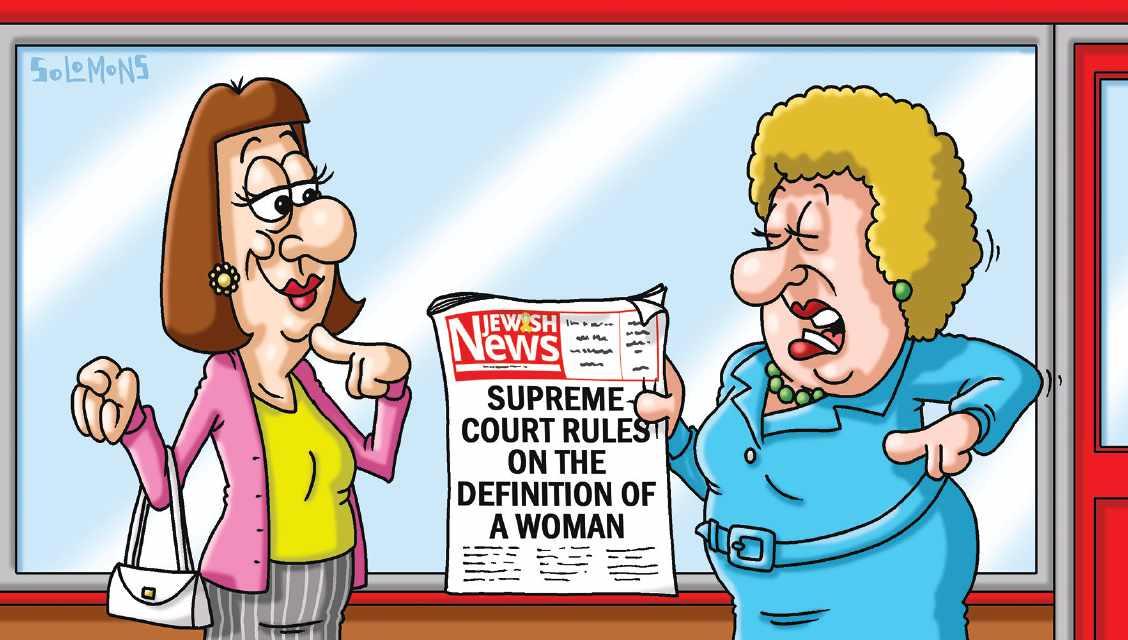

We enter the new financial year facing additional financial burdens on an already stretched charity and social care sector. The 1.2 percent rise in employers’ National Insurance and the lowering of the NI threshold in the Budget add £1.1 million to Jewish Care’s annual wage bill.
Many of our care home residents are funded by already financially squeezed local authorities, and we need to find ways to bridge the gap to meet the true cost of care.
Despite these financial pressures, I’m proud that we continue to align our pay with the London Living Wage to retain and reward the exceptional people who make our work possible. I spent a morning on the frontline with some of them to see our critical work in action at Jewish Care’s Otto Schi care home for people living with dementia at the Maurice and Vivienne Wohl campus.
Representing 54 nationalities of all faiths and none, 550 of our 1300-strong workforce are frontline care sta . They have a shared purpose – to ensure we give people in our community the care, dignity, and respect they deserve within a Jewish environment.
I’m excited and ready to pick up my uniform from the registered manager, Kemi Ariba, at 7.30am.
On the way to the morning handover meeting, I stop to talk to one of the care team who is starting her day. She tells me that she is going to the funeral of a gentleman she cared for over the past six years.
He didn’t have family and she was clearly saddened by the loss, however expressed this as an important part of her everyday role in providing compassionate care.
We join Allan, Sonia, Maria, Leezette and Kemi and as I listen to their handover. I feel a deep sense of pride and responsibility in being involved with this vital part of our work. It is clear that the team holds decades of experience and expertise in providing 24/7 professional care as they share essential information about each resident’s wellbeing






and holistic needs with warmth and clear clinical insight.
We move up to the care home floor. There is a calm atmosphere and I’m surprised to see many residents already up and dressed by 8.30am, taking great pride in their appearance, some of them looking as if they could be ready for shul on Shabbat.
The staff are like family to the residents, enabling them to feel safe and cared for, with personalised preferences catered for; knowing who likes a bit more butter on their toast or a bit more jam. They bring calm, positive energy and a sense of humour with their care along with a real passion for their work.
I am greeted by some of the residents with warmth and curiosity as I assist with making breakfast. I chat with Doreen Reindorp, 97, a great-grandma who worked in Salford as a seamstress and a shop assistant.
She says she loved chatting with customers, which is evident as she‘s a wonderful conversationalist with a great sense of humour.
Betty Escane, 92, who was evacuated
to Cornwall, went to school in St Austell, where I often go for holidays and we compare notes.
She worked in women’s wear in a London department store before being a full-time mum, proudly sharing that her late husband worked in the film industry. Her son, Mark, calls to say good morning and to check in with his mum.
Rabbi Junik, our pastoral and spiritual lead, comes to make a pastoral visit to the residents, creating another ripple of positivity.
I chat with Marjorie Don, 94. The scales of justice on her door refer to her being a qualified at the Bar before raising three daughters, later becoming a lay magistrate and full-time chair of industrial tribunals in London, then travelling the world with her late husband to visit her grandchildren and great-grandchildren.
The people I meet rejuvenate me. My experience instills an even stronger conviction of the urgent need to continue to provide this essential Jewish care for our community.





MARK ADLESTONE CHAIR, JEWISH REPRESENTATIVE COUNCIL
I‘ve always placed emphasis on engaging with di erent people in multiple settings throughout society.
I’ve achieved this by running a business with stores throughout the country alongside my extensive involvement with charities. Coupled with my year as high sheri of Greater Manchester, I feel truly blessed to have encountered people and places from every walk of life.
It has encouraged me to fight prejudice and promote tolerance and think about what being British really means. The way people identify with that concept di ers across communities. There have been times where we have all spectacularly come together with a sense of national pride. Examples include the London Olympics, Platinum Jubilee and the death of Queen Elizabeth II.
However, overall, we have long since struggled to define Britishness and this has led
in some quarters to common decency being eroded with individuals pumping out problematic content to millions on social media.
At a recent civic reception to celebrate the Jewish community, I spoke about how comfortably my Jewish and British identities sit alongside one another. As chair of the Mustard Tree charity, I meet asylum seekers who are desperate to become British and actively contribute to our shared society. I have witnessed the generosity of people who themselves may be struggling who go out of the way to assist those who are vulnerable.
At a time when we are all having to navigate a surge in hate crime targeting minority communities, it is more important than ever that we coalesce around long-established British values. In my mind they have respect for the rule of law, accepting di erences, supporting the underdog, being tolerant of the other with a freedom to worship in accordance with your religion and vote freely with your conscience.
The definition as to what constitutes Britishness needs to be wide and encompass people on all sides of the political debate. Disagreeing
respectfully with one another is a cornerstone of living in a liberal democracy. We need to be prepared to feel uncomfortable and challenged in robust debate. By having a firm agreement across all communities of what being British means, we will be able to call out and subsequently sideline extremists. These ideals can be taught as standard in our schools and universities to provide best practice as to what constitutes acceptable discourse.
To uphold these values and traditions, we also need courage and an unbreakable will to do what is right. We are blessed within our region that our elected representatives and those tasked with keeping us safe hold these principles dear. However, the Jewish community has
been let down by some big settings in Greater Manchester that have allowed extremist voices the opportunity to perform at sell out venues.
For decades, Jewish people have frequented the Bridgewater Hall and Stoller Hall. It is therefore doubly painful that not only are they willing to book racists, they are unprepared to cancel when the full dossier of charges has been submitted. By using my above test, both Sheikh Alafasy and Bassem Youse would be considered extremists and outside British values. It should have been easy to exclude them on this basis but the venues displayed neither the courage of their convictions nor the moral fortitude to do so.
Despite recent challenges, I remain optimistic for the future as it is still the case that Britain is an open and accepting country in which to live. We simply need to reclaim the narrative that will embolden us to protect freedom of speech whilst making it clear that those who wish to divide us are not welcome.
I urge our politicians to pick up this mantle as a strong definition of Britishness would fill a vacuum that has been deliberately exploited by those with an insidious agenda.












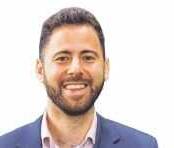
PHIL ROSENBERG PRESIDENT, BOARD OF DEPUTIES
The Board of Deputies is a democratic organisation. It is a broad tent, containing 300 representatives from all denominations of Judaism and spanning a wide range of political opinion. Deputies often speak in public on a range of issues and often take positions that are at odds with the o cial policy of the Board itself.
This is not surprising. We all know that, where there are two Jews, there are three opinions. And the world’s only Jewish state is the most rambunctious of democracies. Ordinarily, we celebrate this diversity of opinion.
This case is di erent. Whether intentionally or otherwise, the impression that has been put forward by certain national and international news outlets is that the letter published last week in the Financial Times, signed by about 10 percent of deputies, is the position of the Board as an organisation, and therefore the position
of the UK Jewish community as a whole. This is emphatically not the case, and as president of the Board of Deputies of British Jews, I speak for the organisation as a whole.
I know many of the signatories well and do not doubt their deep love of Israel and their devotion to its wellbeing. As the war has gone on, I have observed, however – both in Israel and outside it – what seems to me a regrettable loss of perspective, mirrored again in this letter.
Hamas is barely mentioned, and when it is, this is only insofar as to blame the Israeli government for its existence and actions. In this telling, absolutely no agency is given to Hamas regarding the failure of the implementation of the second stage of the hostage deal.
We yearn for the return of the remaining hostages. Yet given that Hamas just weeks ago rejected yet another mediation put forward via Egypt, which would have required it to disarm, I am unable to agree with the viewpoint aired in the FT letter which lays blame squarely on the Israeli government. I am confident that the vast majority of deputies and the Jewish community as a whole agree with me.
Again, I believe that the signatories to this
letter have a strong and completely genuine concern for the situation in Israel and Gaza. But they are now experiencing what I and other senior Board representatives know all too well: that it is remarkably easy to get the media to listen to you in this country if you highlight your Jewish identity while vocally criticising Israel or its government.
Thinking about it objectively, for a letter signed by three dozen people to make headlines in an assortment of national newspapers, while television and radio producers fight among themselves to get signatories to appear on their shows, makes very little sense.
The reason for it is simple; it feeds into an underlying and dangerous narrative about ‘good Jews’ and ‘bad Jews’. This was aptly summed up in a Twitter post by Jeremy Corbyn’s former shadow chancellor, John McDonnell, where he stated: “There’ll be some who will criticise this letter from some members of the Board of Deputies, saying why only one in eight have signed it and why so late. Yet every signatory should be welcomed into that courageous band of Jewish people who have stood up for peace and an end to the killing.”

I don’t think a single one of our 300-plus deputies opposes “peace and an end to the killing”. But that does not stop the implied slur. I urge us all to remember that unity is strength. Division serves only our enemies. It is OK to disagree le-shem shamayim – for the sake of heaven. It is even better to agree for the sake of heaven. And on so much, there is unity.
We all want to see the hostages out. We all want Hamas defeated. We all want to see definitive progress towards lasting peace and security for Israel and the Middle East.
The Hamas regime is crumbling. Yesterday, renewed mass protests took place in Gaza against Hamas, as they have repeatedly over the last month, despite the risks to Palestinians in protesting the despotic regime. We pray for its downfall, the return of every hostage, and an end to the war which will allow Israelis and Gazans to rebuild their shattered lives.
I believe the Financial Times needs to learn to count: 90 percent of deputies is a bigger than the 10 percent who signed this letter. For our part, the Board of Deputies, will continue to be unstinting in our advocacy for the majority of our community and our shared values.












110 members and friends gathered for the ever-popular communal seder at East London & Essex Liberal Synagogue. The service was led by Rabbi Richard Jacobi and Emeritus Rabbi David Hulbert. They were joined by Bishop Guli of Chelmsford, her husband Lee and the Archdeacon of West Ham, Mike Power.
More than 70 children gathered for a special charity netball tournament in honour of Bella’s batmitzvah, raising an incredible £4,700 for the ‘Our Children Our War’ charity. The Israeli-based organisation is supporting over 30 orphans under the age of 18 who tragically lost both parents in the 7 October attacks. Deeply moved by the plight of these children, Bella (surname withheld on request), chose to fundraise helping a young Israeli girl her own age – another batmitzvah girl who now faces this milestone year without her parents.
Young people from different faith backgrounds and communities in London took part in an evening of volunteering at the Project ImpACT Youth Kitchen. The teens from north, east and west London cooked more than 150 healthy meals for local food banks using surplus food provided by The Felix Project. In collaboration with the Faith and Belief Forum and supported by Barnet Multi Faith Forum, the ImpACT project welcomed teens from the Znaniye Foundation and Salaam Peace. One, Alex, said: “Every week that I come to volunteer I get to see the difference we make helping people which is really inspiring and humbling.”
On a recent trip to Israel, the Manchester Friendship Circle rolled up its sleeves to sort more than 20 tonnes of fresh produce that national food bank Leket Israel rescued for distribution to 10,200 Israeli families in need over Pesach. Friendship Circle member and volunteer Hannah Mandel said: “Being able to pack the food and give something back to people in need of food is not only breathtaking but it’s also making me feel so privileged for everything I have back in England. Being here makes me feel so proud.”
Following the massacre of 7 October 2023, 10-year-old Jenson Block from Chigwell decided to make yellow ribbon bracelets with the names of all the remaining hostages. The Spurs fan designed and created a website, an Instagram page, set up stalls at school fetes and outside his home, raising more than £500. The funds were recently handed over to the Hostage Families Forum in Israel, by a relative who was visiting Hostage Square during the release of Eli Sharabi, Ohad Ben Ami and Or Levy. To support Jenson, visit his online shop at braceletsby-jenson.sumupstore.com
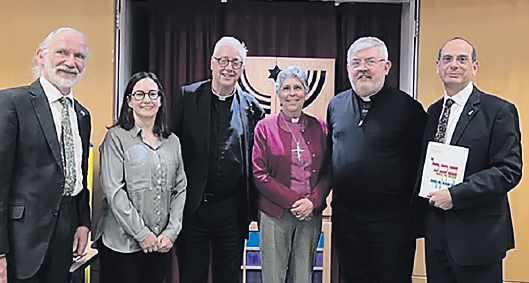
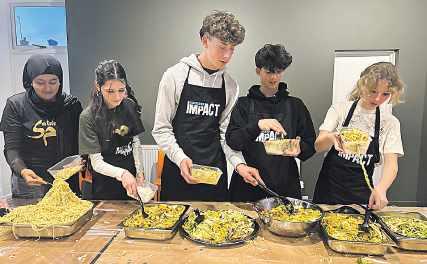
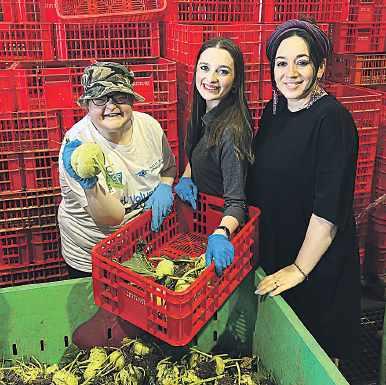


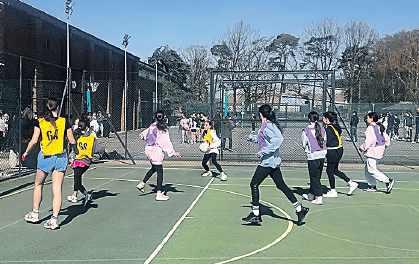


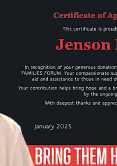

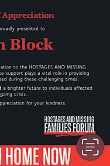


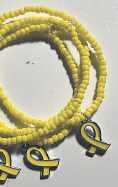
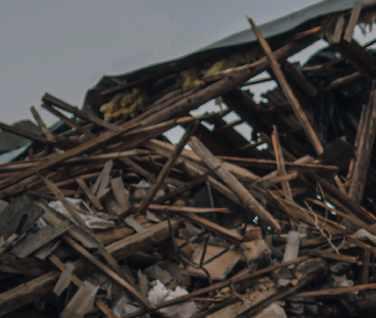

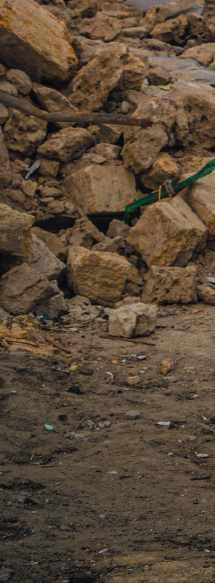

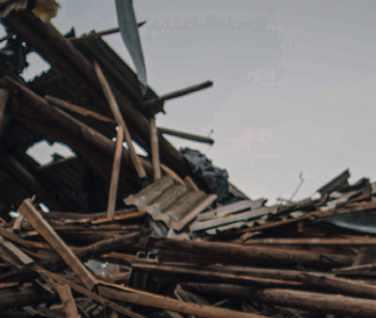




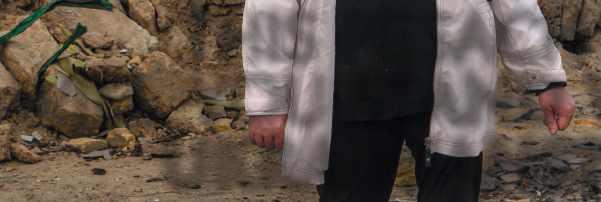
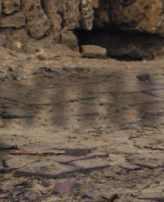

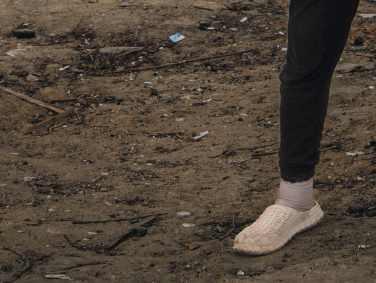
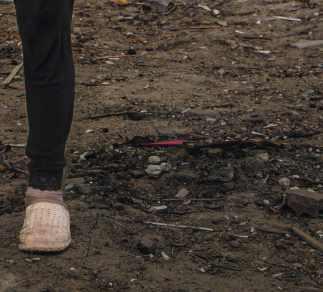

















A look
Abraham analysed Israel’s sporting promise
Helen Lederer explores her mixed-faith heritage and the Alps in the new series of Pilgrimage.
By Debbie Collins
Helen Lederer is with six new friends on the top of a mountain. The 70-yearold actor and author is here for Pilgrimage:TheRoad ThroughtheAlps. In the BBC series, which started on Sunday, celebrity pilgrims of all faiths, beliefs and fitness levels go on a personal journey over 12 days. For this year’s challenge they are facing Alpine climbs in Austria and finishing near Switzerland’s Lake Zurich, with a visit to the statue of the Black Madonna at the Benedictine Abbey.
A cast including television presenter Je Brazier, footballer Harry Clarke, comedian Daliso Chaponda and journalist Nelufar Hedayat ranges in beliefs from Agnostic to Catholic to modern Muslim and, with Helen’s mixed Jewish/Christian heritage, most faiths or non-faiths are covered.
Pilgrimage highlights positive human connection regardless of beliefs and, as Helen says, “there’s no room for faking it. You’re too bloody knackered after hiking all day.”
As a comedy icon of the 80s and 90s, Helen frequently performed her schtick on the stand-up circuit, everpresent in shows like Ab Fab, Girls on Top and Bottom
I ask if she had seen previous seasons of Pilgrimage
“I had seen clips. And people walking...” [You never quite know if Helen’s being serious] “…but I hadn’t understood the purpose of being together with people to ‘find’ something – whether a statue at the finish or more than that. Now I understand the significance of it.”
Did you train?
“I moved a bit... instead of not at
all. Did some pilates, walked, got a fitness tracker. I took the opportunity because it probably won’t present itself to me again. I’m pleased I did it, even though I look like a duck walking.”
Did you celebrate any Jewish festivals growing up?
“I believe in God but I’m just not sure what the God is. My father was born
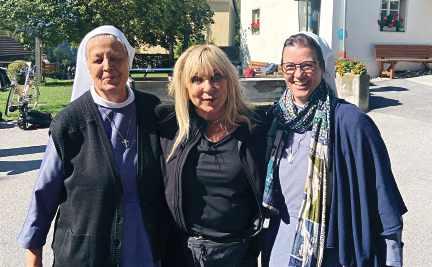


into a Jewish family and although my Czechoslovakian grandparents were cultural Jews, they never talked about faith and we never celebrated Jewish festivals or traditions.
“As a refugee my dad met my mother who was Christian and came from the Isle of Wight, but the important thing for my parents was settling and becoming ‘English’. I’m told I was christened.
“As I get older, I’m learning that you can’t shed your background. So, with my mixed heritage, with all the pain of my family that isn’t mine, but theirs, I wanted to be able to turn it into something that will give me a bit of peace. I think it’s ok

I’m busy with book promotion for my memoir, which we’ve just republished in paperback, so it was wonderful to include extra chapters on Pilgrimage and one dedicated to my dear friend Tony Slattery, who died in January.”
Did you have reservations about sharing deep thoughts and feelings with strangers?
to live in a faith without certainty about which side you’re on.”
Had you visited Austria before?
“I skied there as a child and smells and memories flooded back, especially of my grandparents, and thoughts about what their life would have been. The emotion just finds you and I felt surprisingly connected to my past – there were lots of Lederers in Auschwitz, so that raised lots of thoughts and comparisons for me.”
Have you continued exploring the outdoors?
“Not as much as I’d like to because
“I loved the conversations around the dinner table, and especially chats with Jay [McGuiness]. I enjoy his vibration and we discussed life after death, talking about the loss of his friend Tom Parker. We made a wonderful human connection even if it wasn’t through being in a church building.”
Who is the most religious of the group?
“I think we were all on our own journey, but there was a lot of ‘tell us the answers, Stef’[Reid], because she was such an informed Christian and very non-judgemental. It was wonderful seeing Nelufar and Stef find a connection with each other.”
Harry seems to be a mensch, carrying your rucksack as well as his own. How was the mix of ages?
“The youngsters were such fun, making up silly games, hugging monks and all sorts. It’s like being in the Girl Guides – singing, engaging, listening. Quite a delicious experience really.”
As a Jewish woman I am prone to overpacking but you only had a small rucksack?
“As long as I have enough pants, a nightie and dry shampoo I can survive on very few items: a black dress to travel in and a chi on blouse over the top of it for bars. All chucks neatly into a rucksack – a travel towel is a joy, too.”
Lederer may have joined the pilgrimage with uncertainty and a mixed heritage but what she found – beyond the climbs, conversations, and songs – was something quietly grounding: connection.
• Pilgrimage is on BBC Two and iPlayer

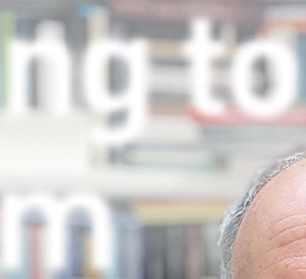
Anthony Julius rises to the challenge of writing about the first Jew by arguing that two versions of Abraham reflect both religiosity and study. By Charlotte Henry
An eight-year-old boy sits, absorbed and frightened by a comic strip that tells the story of a father and son. It was the first time Anthony Julius had read the story of the Akedah, the binding of Isaac by Abraham. It has stuck with him ever since.
“It really dismayed me,” recalls Julius, sitting in an o ce that has more books than it has space for. (I didn’t spot any comics, sadly). This dismay was “not so much because of what it showed to me about God’s character, because I’d seen that in the story of the flood that I’d read, but because of what it showed me of the character of a father, an exemplary father. And to my eight-yearold mind, that was very disturbing.”
Julius has now been given a chance to provide his own perspective on that “exemplary father” in his new book Abraham – The First Jew. “To have the chance to add my own contribution to this immense fund of thinking was not to be passed up,” he says.
There have been biographies of Abraham before, of course, adding to the burden that comes with writing about such a totemic figure. “He’s a person of great interest to Jews,” says Julius, which is to put it mildly.
Whether it is references to the Abrahamic religions or the Abraham accords, through which Israel signed peace deals with nearby Arab neighbours, Abraham’s story ultimately flows through the heart of Judaism and Jewish life to this day. The importance of this one man makes it all the more necessary, and all the more difficult, to write about him.
Julius approached the task by treating the Torah account of Abraham as “foundational” before building on this with “Midrashic material, which provides the story of his early life, and that’s supplemented by Maimonides writing on Abraham in the Mishnah Torah”.
This does then present the challenge of finding something new to say, of o ering a di erent perspective on a story everyone thinks they know already. “I do think there is some originality in my approach,” says Julius. “I hope there is. I hope I’ve added, rather than just replicated what’s already there.”
He did this by arguing that there are two versions of Abraham – 1.0 and 2.0, as it were.
The first is an intellectual who grew up in a polytheistic society that he first challenges and then “emancipates himself from”.
Abraham ends up with the “conviction that there’s only one God, there’s only one person in in charge, and that’s an immense intellectual achievement”, believes Julius.
This second Abraham is devoted to God, a true believer who does not challenge the Almighty, to the point that he is prepared to kill his own son after being commanded to do so. “That’s a very di erent kind of Abraham,” says the author. He also contrasts Abraham with his wife, Sarah, who is portrayed almost as the original feminist who never really shifted from her intellectual approach. She is said to have died upon hearing about the Akedah.
Julius says he might well have written a joint biography of the couple, such is the interesting nature of their relationship. His reading is that theirs was
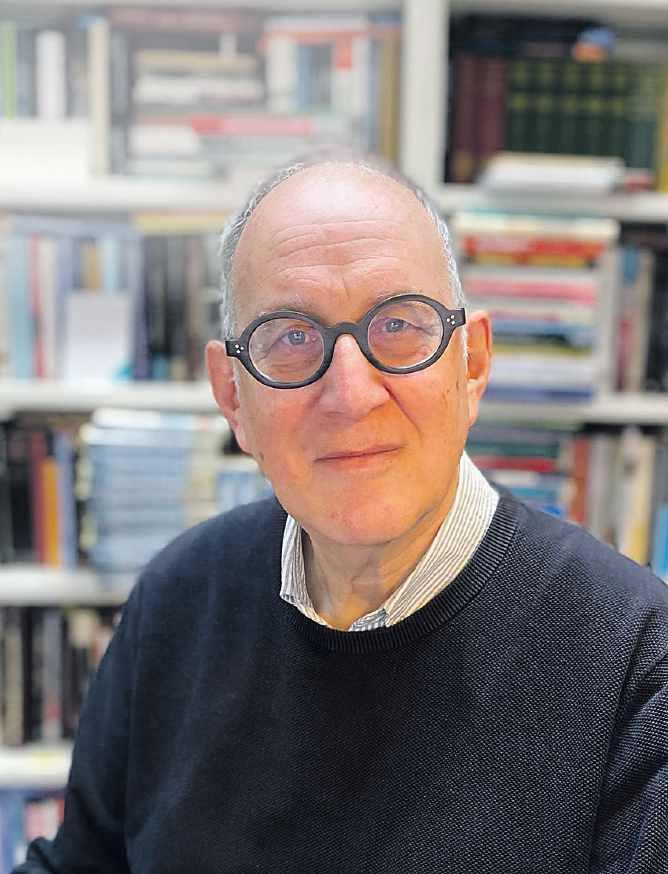

marriage that starts well but “goes into steep decline”, Abraham’s two phases also reflect a division in Judaism between religiosity and study, “the difference between reading a book and hearing the shofar”, as Julius puts it.
Alongside this intellectual context, Julius describes his work as “a highly personal book” that“gave me the opportunity of reasoning with myself on the subject of my own Jewish character”.
And the conclusion? “That it’s difficult to be a Jew… and that is the glory of being a Jew.” The last 18 months might not have felt very glorious, but they have certainly underlined that difficulty. Yet Julius doesn’t think that the horror of October 7 and its aftermath altered his work too much: “There’s a distinction between a Jewish life which is forward facing, confronting the enemies of the Jews, and a Jewish life which is lived reflecting on the
nature of one’s Jewish character and Jewish journey. And this book is very much in the second category rather than the first.”
Despite this, there is a comfort that comes from reading the book, of learning once again that Jewish life has been di cult from the outset but has always survived and, indeed, thrived.
Julius himself could be argued to have something of a split life. He is both an accomplished lawyer and the author of multiple books who describes himself as having “a kind of horror of repeating myself”.
For instance, this particular work is “novelistic, and there’s dialogue and character and action”, while the project he is currently working on is a book all about free speech. It’s another shift in direction.
As Jews we learn about Abraham from a young age. We are assumed to know his story. Returning to our roots is comforting and important, but
there is always something new to learn too, a new approach to take. Anthony Julius does that in this book. At least one of the versions of Abraham might have approved of that.


Douglas Murray’s latest book, On Democracies And Death Cults –Israel, Hamas And The Future Of The West, is a painstakingly researched commentary on Hamas’ terrorist attack on Israel on 7 October, 2023.
Documenting not only that day’s horrific events, Murray contexts the history that preceded 7 October and o ers a disturbing analysis of the antisemitism that has underscored so much of the global response to both Israel and diaspora Jews that followed.
In a world of mainstream media and commentary that frequently fails to report Israeli a airs without a contemptuous bias, Murray cuts through the noise with a rare clarity. His arguments are rational, factbased and dispassionate. As a non-Jew, he also brings “no skin in the game” whatsoever when he writes about the Jewish state.
Murray’s dispassion makes the book an emotional challenge. His documenting
of the details of the 7 October massacres, drawn from numerous conversations with many of the day’s witnesses and survivors, makes harrowing reading. An outstanding interlocutor, Murray adds no sensationalism to his reporting, letting his subjects’ testimonies speak for themselves.
There are moments in the book when the sheer inhumanity of that day’s barbarity defies comprehension, making it di cult for the reader not to weep.
The antisemitic hatred that has erupted across western cities and campuses over the past 18 months is equally well documented, not least the evil duplicity of those nobly calling for “all women to be believed” unless it seems, of course, they are Jewish women.
The book is bolstered by Murray’s depth of historical reference. He points to the scourge of radical Islamism having been being sparked by the 1979 Iranian Revolution that saw the return to Tehran of Ayatollah
From individuals items and specialist collections to complete house clearances, removals, and probate valuations. We do as much as you need - just ask !!!
• As an independent broker acting on your behalf, I aim to get the highest prices for your pieces
• No need to worry about posting your valuables
• I sell through many different auction houses, high-end dealers, collectors and private clients
• With over 18 years in business you will always receive my personal discreet one-to-one service
• Free consultations at your convenience

the UN Conference in Durban, South Africa (of all places) in 2001 that was to provide the fallacious grounding for Israel being described as an “apartheid state”.
We also learn that as early as 1964, some three years before Israel’s borders were redrawn following the Six-Day War, Yasser Arafat’s Palestine Liberation Organisation was calling for the “liberation” of the “occupied territories” – that is, the destruction of the State of Israel.

Khomeni from his Paris exile and the subsequent banishing of Iran’s Shah. He reports the irony of Iran calling Israel a colonial outpost of the USA, while simultaneously establishing its own colonial outposts in Gaza, Lebanon, Yemen and elsewhere. Murray highlights
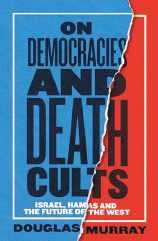

Murray’s research and travels have been extensive. He has visited most of the countries that border Israel, and since 7 October alone has visited not only Israel but also Gaza, enabling him, unlike most contemporary commentators, to o er an evidence-based perspective.
unlike reading.
When Murray reports that Egyptian bookshops still stock numerous copies of Mein Kampf and The Protocols of The Elders of Zion, believe him.
Murray writes of a tragic history that is still being written. His book makes for essential reading.
• Future
• On Democracies And Death Cults – Israel, Hamas And The Future Of The West is published by HarperCollins, £25



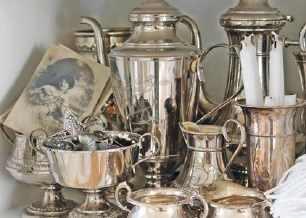








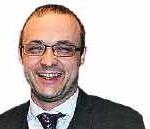
In our thought-provoking series, rabbis, rebbetzins and educators relate the week’s parsha to the way we live today
RABBI ARIEL ABEL CF LLM
SOLICITOR & BRITISH ARMY CHAPLAIN
This week’s Torah reading, Shemini, marks a pivotal moment in the Israelite journey, the inauguration of the Mishkan (Tabernacle). Tragedy mars this occasion, as Aaron’s sons, Nadav and Avihu, o er an unauthorised fire o ering before God; in devastating punishment, divine flames consume them.
Divine worship requires profound sanctity. The term shemini (eighth) signifies a realm beyond the natural order, introducing a supernatural dimension to the spiritual event of the consecration reported on in this reading. The fatal incident resulting underscores the necessity of adhering strictly to divine commandments, highlighting that even well-intentioned
deviations can lead to dire consequences. This perspective stresses the importance of discipline and reverence in religious observance, ensuring that worship aligns with God’s explicit instructions. Where in this is there any evidence of compassion for the erring individual, for the human in us all? Why can’t God’s law be more humane?
In contrast, note Aaron’s response to his sons’ deaths. Despite his profound grief, Aaron stays silent on the matter and chooses not to partake in the sacrificial meal.
When Moses questions this abstention, Aaron explains that consuming the o ering in his bereaved state would be inappropriate. Moses accepts this reasoning, illustrating the Torah’s acknowledgment of human emotion and the necessity for compassion in leadership. By implication, this is a directive for future leaders to deliver halacha (Jewish law) with empathy, recognising an individual’s circumstances and emotional state, embracing a lead-
Location: London
Salary: Circa £90,000
Closing date: 11th May 2025
If you wish to have an informal discussion about the opportunity, please contact our retained advisors at Prospectus, Linda Griffiths or Jane Ray:
linda.griffiths@prospect-us.co.uk jane.ray@prospect-us.co.uk
ership style that balances strict adherence to law with sensitivity to human experience.
Rabbi Jonathan Sacks o ers a synthesis of these perspectives by exploring the dual themes of universality and particularity in Shemini. He describes Shemini Atzeret, the ‘eighth day of assembly’, as a time when God invites the Jewish people to linger, symbolising an intimate relationship between the divine and the individual. Rabbi Sacks interprets this as an embodiment of both the sanctity of divine worship and the compassion inherent in God’s relationship with humanity.
He posits that true religious observance requires a balance between keeping the sanctity of rituals while exercising compassion and understanding to oneself and to others. This quest for an equilibrium ensures that religious practices are both meaningful and accessible, fostering a community that upholds divine commandments with empathy and care.
In contemporary times, this balance is
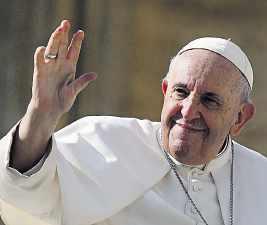
exemplified by leaders who navigate the complexities of tradition and modernity with wisdom and compassion.
In the Christian world, the experience of the late Pope Francis has exemplified a leadership cognisant of the humanity of leadership and the needs of ordinary people. This should be recognised, even if in his final years his interventions on Israel were controversial.
The Jewish experience is one that demands at least as much, if not more, compassion than technical halachic standards. Compassion is, for the Jewish people, the bottom line and the basic standard beneath which we must never drop.
The Anne Frank Trust is an education charity that empowers young people aged 9 to 15 to recognise and challenge all forms of prejudice through learning about Anne Frank, antisemitism and the Holocaust.
As we approach the centenary of Anne Frank’s birth, we’re seeking a visionary Chief Executive to lead the Trust into its next strategic phase expanding our reach and deepening our impact.
This is a unique opportunity to lead:
• A mission-driven organisation with national reach, working with thousands of young people in schools
• A passionate, experienced team and committed Board
• A charity with significant growth potential
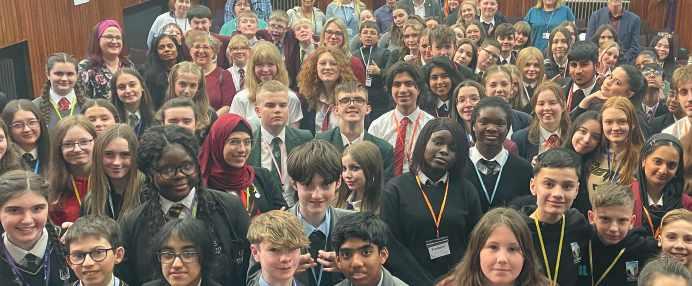
For further information about this exciting opportunity and to find out how to apply, please visit the dedicated microsite at: https://www.prospect-us-site.co.uk/aft-ceo
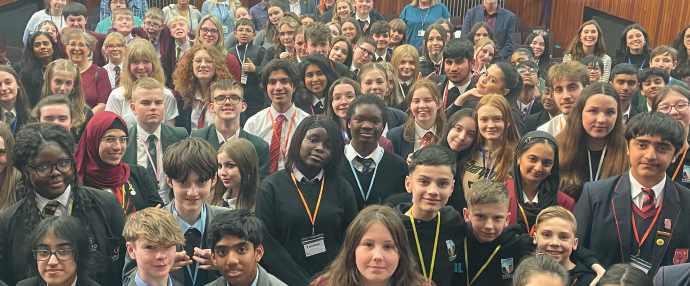



BY RABBI MARK GOLDSMITH EDGWARE AND HENDON REFORM SYNAGOGUE
This is an exciting and creative time for Liberal and Reform Judaism. We are probably weeks away from achieving what has eluded us twice, in 1942 and 1983: creating a single Progressive Jewish movement for the UK. As a lifelong Progressive Jew, whose family’s roots in Liberal and Reform Judaism go back nearly 200 years, I know we are in the right place now for this merger to take place. Both movements now have an established route to equilineality, enabling children of one Jewish parent, irrespective of that parent’s sex, to have recognised Jewish status. Both movements today are built by people of any sexuality. Both are fully egalitarian. Both have become fully able to inte-
grate and build the Jewish lives of mixed faith couples and families.
Reform Judaism is now more diverse and flexible in its interpretation and Liberal Judaism responds more enthusiastically to Jewish tradition. We celebrate the diversity of our synagogues and communities. It’s time to be one agudah (brotherhood and sisterhood) of Progressive Judaism.
It’s time to enjoy a rainbow of synagogues across our new movement with di erent styles of e ective Jewish worship, di erent ways of building community, some with most of their children in Jewish day schools and some with most in mainstream schools.
We will be united by the principles that we include and welcome the true diversity of the Jewish community, that we accept personal Jewish autonomy and that we promote a nonjudgmental approach to Jewish life together with the necessity to engage with the nonJewish communities around us.
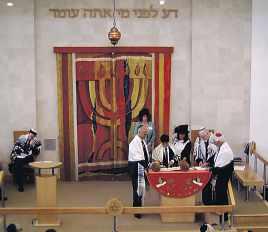
A stimulating series where our progressive rabbis consider Judaism in the face of 21st-century issues
government and the nation as central to the Jewish community. We will be able to be a better home for those who are converting to Judaism. We can train our leaders together – whether they are rabbis and teachers at Leo Baeck College or the lay leaders who make our communities effective.
We will be able to put across the deep fulfilment of a Progressive Jewish life, our questioning approach to theology, to our classical texts, to ways of worship and to Jewish thought in a way where di erence is validating not undermining. We will be able to run our administration as a movement more e ciently by avoiding duplication.
As one Progressive movement I believe that, as duplication turns to building together, we will be able to find resources to support our university students much better than we can now, to increase the diversity of our youth provision and to develop Jewish education more e ectively for today.
Our stronger voice and action together will make our social justice campaigns stronger and enable us to be heard by
I know that in my excitement about the future, the synagogue that I serve will be fully able to preserve its distinctive traditions and style of Progressive Judaism. At the same time, it will be part of a movement that can not only serve it better but which can make sure that wherever our members or their children settle in the UK they will find a welcoming Progressive Jewish home.

Top prices paid
Antique – Reproduction – Retro Furniture (any condition)
Epstein, Archie Shine, Hille, G Plan, etc.
Dining Suites, Lounges Suites, Bookcases, Desks, Cabinets, Mirrors, Lights, etc.
House clearances
Single items to complete homes MARYLEBONE ANTIQUES - 8
07866 614 744 (ANYTIME) 0207 723 7415 (SHOP)
ARTICLES WANTED

- e-mail - info@maryleboneantiques.co.uk MAKE SURE YOU CONTACT US BEFORE SELLING

Furs, Jewellery, Old Costume Jewellery, Watches, Silver, Designer Bags, anything vintage. 01277 352560
Friendly Family Company established for 30 years

our Legacy Team on 020 8922 2840 for more
We clear houses, flats, sheds, garages etc. No job too big or too small! Rubbish cleared as part of a full clearance. We have a waste licence. We buy items including furniture bric a brac.
For a free quote please phone Dave on 07913405315 any time.


Confidential Bereavement Counselling for adults and children individually. Support Groups available. We offer in person, online and telephone counselling. Contact Jewish Bereavement Counselling Service in confidence. 0208 951 3881 enquiries@jbcs.org.uk | www.jbcs.org.uk CHARITY & WELFARE


